MOSCOW — With President Vladimir Putin's victory all but assured as Russians headed to the polls on Sunday, only one thing remained uncertain and potentially damaging for the Kremlin: how many people would turn out to vote and hand him a convincing mandate for a fourth term.
On a bitterly cold but sunny election morning, Muscovites were surrounded by reminders of the importance of voting.
"Choosing a president, choosing a future," was the message staring back at the passersby from one of the flashy billboards on Kutuzovsky Avenue in the center of the capital.
Sales manager Anna Popova, 31, said the billboards have been a constant presence and just one of many ways in which the Russian public was urged to get out and vote.
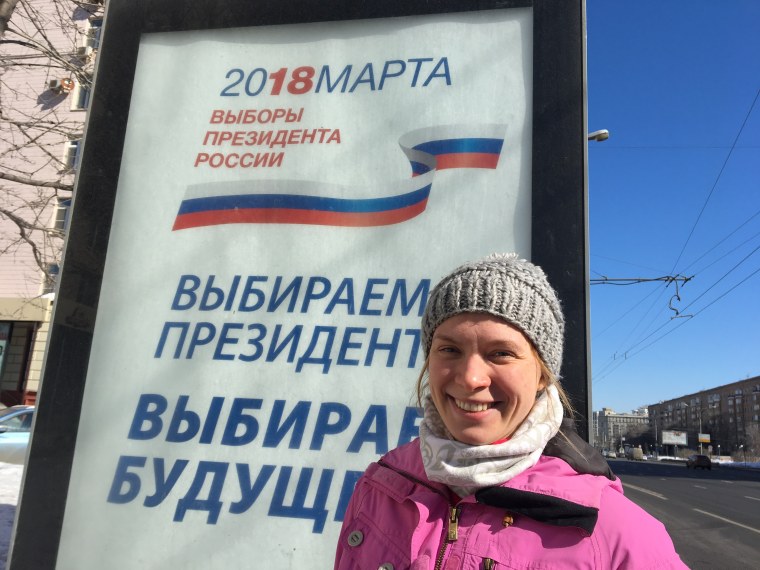
Popova said she was bombarded by text messages and push notifications from various Russian-language apps on her phone about the election.
"It's hellish," she told NBC News on Sunday. "It is a hysteria. Someone really cares about this stuff."
Despite a recent poll showing that over 80 percent of Russians were either certain or very likely to vote, the Kremlin took no chances.
Turnout-boosting efforts were the most visible feature of the campaign — and all came from taxpayers' pockets.
Related: Voters share their hopes for Russian election
Election monitors, meanwhile, were reporting irregularities at voting stations across the world's largest country, even though authorities were under orders to ensure that the voting was free and fair after violations marred Putin's last election, in 2012.
More than 65 percent of Russians cast their ballot then, voting Putin into power with more than 63 percent of the vote.
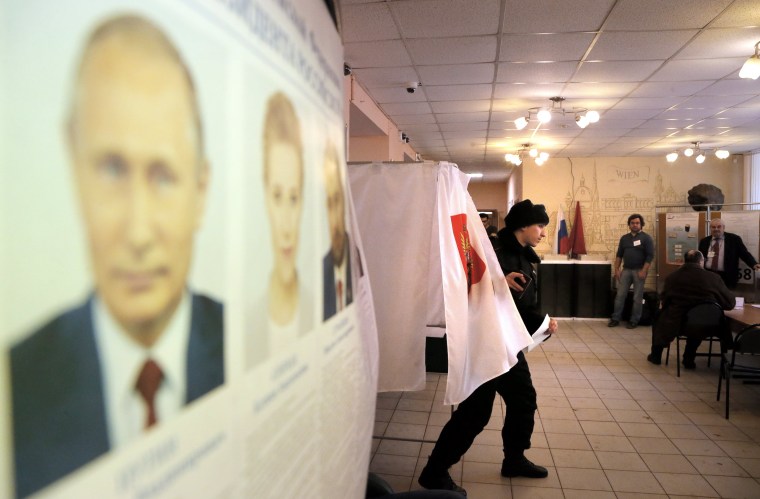
Putin, 65, is nearly guaranteed to sweep the vote this time, as well, but with a political field lacking any competition or intrigue, how many votes would the Kremlin be content with?
"It's a key issue of how much he can genuinely claim that he has the support of the Russian people and how much he has to fiddle, tweak and manipulate," said James Nixey, head of the Russia and Eurasia Program at Chatham House, a London-based international affairs think tank.
Yevgeny Roizman, the mayor of Russia's fourth-largest city, Yekaterinburg, told The Associated Press that local officials and state employees all received orders "from higher up" to make sure the turnout was over 60 percent.
"They are using everything: schools, kindergartens, hospitals — the battle for the turnout is unprecedented," said Roizman, one of the rare opposition politicians to hold a significant elected office.
Casting his ballot in Moscow, Putin seemed confident of victory, saying he would consider any percentage of votes a success. "The program that I propose for the country is the right one," he said.
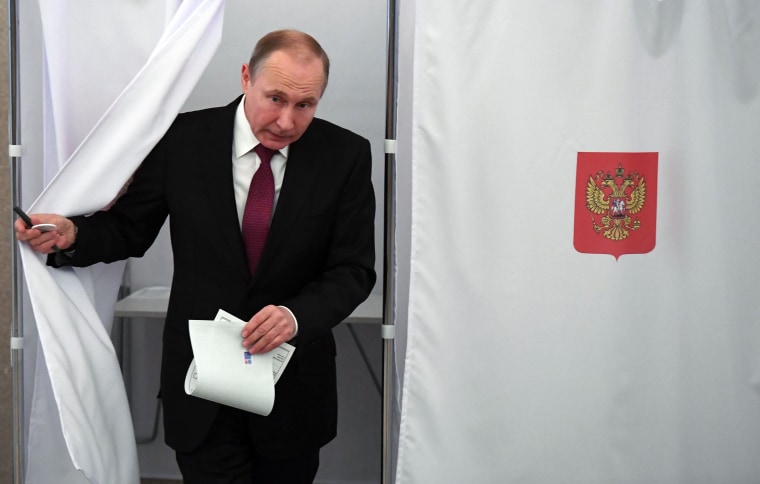
In 2012, Putin faced a serious opposition movement, but since then he has boosted his popularity thanks to Russian actions in Ukraine and Syria. Sunday, he faced seven challengers but no serious threat to his rule.
With Putin certain to win, some in the opposition instead turned their attention to making their voices heard by refusing to vote.
Alexei Navalny, a lawyer and one of the most outspoken Putin critics who was barred from running for president himself, called on his supporters to boycott the vote. He reasoned that lower voter turnout would signal to the Kremlin and the world that a significant number of Russian citizens didn't see a viable alternative on the ballot and refuse to participate in what Navalny calls "Putin's re-election."
Related: Russian election: Navalny rallies army of observers to counter Putin
Аround 770 million rubles (more than $13 million) were allocated to publicize the election by the Central Election Commission.
The logistics of voting were made easier by a new policy allowing people to vote at any polling station regardless of where they're registered. A number of Russian celebrities promoted the idea on their social media channels, accompanied by the hashtag #votewhereyouare.
Outside some polling stations in Moscow, voters were treated to a bowl of steaming buckwheat, with Soviet-era music blasting in the background. Most voters were also handed colorful "I voted" pins and balloons.
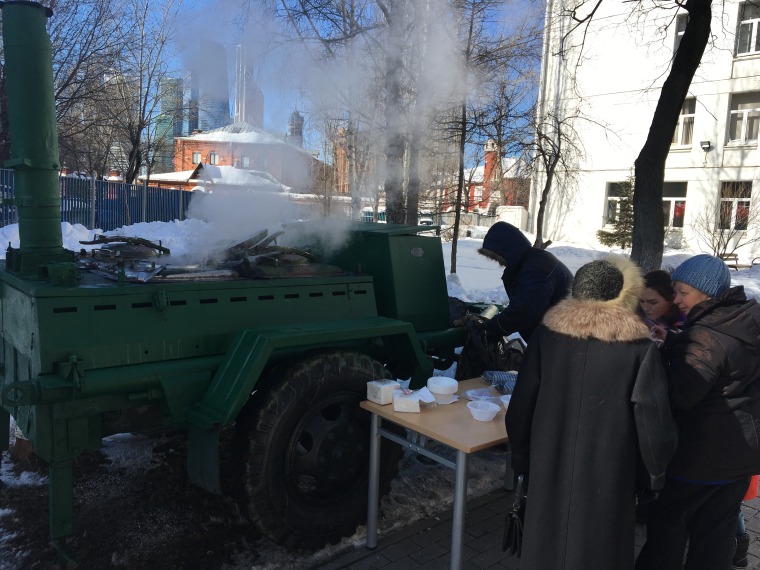
First-time voters were even being given free tickets for pop concerts, and health authorities offered free cancer screenings at selected polling stations.
Anton, 28, a food industry worker, told NBC News outside a polling station in central Moscow, where heavily discounted food was sold and animators entertained voters all day, that he gave his vote to Putin.
"I don't see anyone more worthy," said Anton, who didn't want his last name revealed.
Natalia, 33, a saleswoman who also refused to give her last name, said she voted at a polling station nearby. Natalia said she also voted for Putin: "I believe in him. I really hope he can keep his health care promises. That's what I care about. I am also happy with his foreign policy. I support him."
In addition to public campaigns, many voters seemed to be under more private pressure to vote.
Earlier this month, a Russian newspaper published a report on the active involvement of private businesses in the election campaign. The paper alleged that grocery shops, gas stations, banks, movie theaters and even public transport were used to encourage people to go to the polls.
Messages texted to people's mobile phones did the same, while Moscow voters received a glossy "invitation to the election" from the election commission.
And with the clock ticking down to election day, messages from employees whose bosses mandated them to vote popped up on Twitter alongside YouTube recordings of teachers urging their students to do the same.
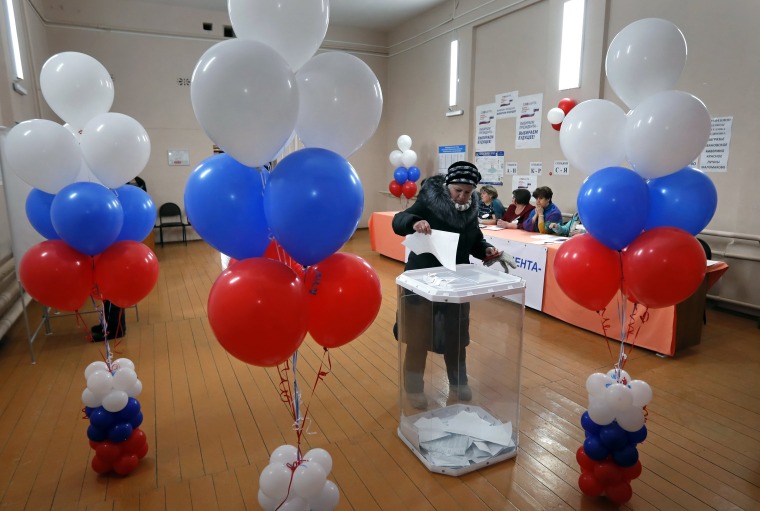
Yevgeny, a 43-year-old mechanic voting in central Moscow, said he briefly wondered whether it was worth voting.
"But the answer was easy. ... If I want to keep working, I vote," he said.
Ella Pamfilova, chairwoman of the Central Election Commission, who was appointed to clean up Russia's electoral system, vowed to respond to complaints about being coerced to vote.
Putin has traveled across Russia pledging to raise wages, pour more funds into the country's crumbling health care and education, and modernize dilapidated infrastructure.
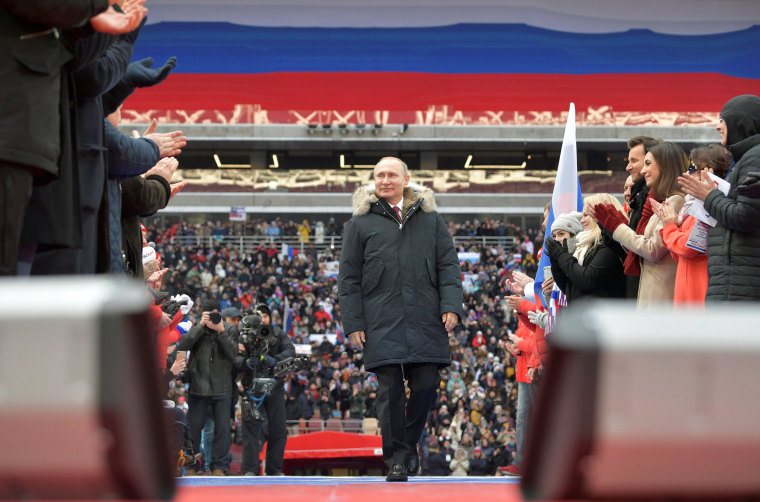
Nixey said the turnout would ultimately be a reflection of Putin's legitimacy and how the next six years are going to go for him.
"If we see a really good turnout and a decent vote for Putin ... I think it's a really good indication that the next six years will be relatively smooth for him. In other words, he's got a groundswell of support he can rely on," Nixey said.
By the same measure, if voter participation and counts are low, the next six years could more difficult, he said.
